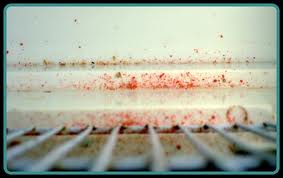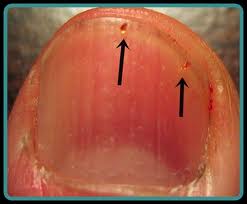The "Red Menace"...
Red Mites are the Vampires
of the Mite Kingdom.
Red mites suck blood from your canary at
night and then go into hiding
during the day.
Tracking down and eradicating these mites in the canary cage could be a matter of life and death for your canary.
Red Mites
These external parasites are blood suckers that feed on your canary at night and go away to cracks and crevices of the cage during the day.


Photos birdmites.org
A few mites, as you might imagine, shouldn't be that big a deal...but mites multiply quickly and may soon become a major health issue.
They are tiny creatures no larger than the smallest pin head. Yet when they number in the thousands they can suck a lot of blood from your canary's little body...making your pet bird sickly and anemic.
Other mites that can affect your canary or other pet birds are...
- --Air Sac Mites
- --Scaly Leg and Face Mites and...
- --Feather Mites.
But...
These mites are the most plentiful and the best known.
Plus, mites carry other diseases that may make matters worse and that can be spread through out your aviary if you have more than one bird.
Does Your Canary Have Mites?
Try placing a white cloth over the cage or fold it twice and place it in the cage in the evening. Check it about mid-morning for tiny red spots in and around the cloth. These are your red mites...full of your bird's blood.
These mites will be difficult to see if they have not had a meal recently. Without a full tummy of blood they become translucent...clear. That's why you check for them in the morning. They've just had breakfast and they're visibly red.
Eradication of Red Mites
Good canary care includes regularly treating for this mite.
There are two important treatments used to kill these mites--and other mites and lice--that WON'T harm your bird.
For the cage's cracks and crevices you MUST use a...
Mite and Lice Spray.
Mite and Lice Spray AND Skin and Feather Spray
Spray will do a lot of good on and around the cage...but is a lot of work when trying to treat for mites on your bird. This spray will only kill the mites that are currently feeding on your canary. Even then it's hit and miss...some mites will be able to avoid contact with the spray. Plus...
The spray is not effective on mite eggs.
You'll have to spray your canary 3 or 4 times at 7 day intervals to make sure you're getting the red mite larvae as they are hatching out.
One of my favorite authors on canary care gives good advice on the use of mite sprays..
|
When treating for red mites and other mites I recommend you use the spray on your bird and cage regularly and for complete mite treatment also use...
SCATT.
is the best way I know to take care of a mite infestation and to PREVENT Red Mite problems in the first place.
Just a drop at the base of the neck, on the skin, will do wonders...not
on you--on your bird ;-)
SCATT is ingested by the mites along with the blood. It kills mites by
interfering with the transmission of nerve impulses...causing paralysis
and death. However...
Birds--like mammals--do not have the same nerve transmission system as mites...so-->The drug is harmless to your pet canary. It's the perfect treatment.
It's very affordable, by the way, and a small bottle will last for years on one or two birds. I recommend Scatt because I use it and it works.Use a mite and lice spray AND SCATT every 3 months even if you don't see mites. It will help keep your bird red mite free and...
...Will keep him S-I-N-G-I-N-G!
If you haven't signed up for your free subscription to CanaryAdvisor.com's Canary Tips! Ezine, do it now.
Accurate, current, to-the-point info on canary care and canary disease--like mites--delivered to your e-mailbox.
Thousands of canary lovers are enjoying
their
Canary Tips! --
Read what some have to
say and sign up...Click here.
It's FREE.
Have you read about Bird Lice yet? Please do...Although not as
devastating as red mites, these
pests can make your canary very unhappy...click
here.
Have A Great Story or Tip About This Topic?
Do you have a great story or tip about canary health care? Share it! It may be of great interest and assistance to other canary owners.
What Other Visitors Have Said
Click below to see contributions from other visitors to this page...
Mites -- How To Keep My Canary Healthy 




U say that a drop of scatt is to be placed at the base of the neck, yet on the scatt bottle they say that it should be placed on the thigh.
So which …






